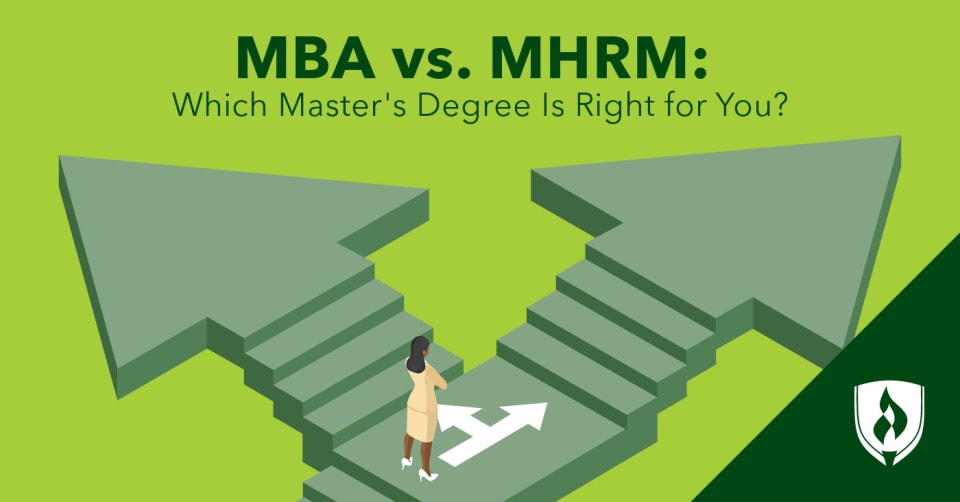
You know you want to advance in the business world, and you like working with people. You also know that earning either a Master of Business Administration (MBA) or a Master of Human Resources Management (MHRM) degree can be a great way to develop your leadership-level skills. But how do you know which provides the ideal path for you?
While we /provide a universal answer for all readers, we can provide as much information as possible to help you decide. Much of this decision has to do with your goals, skill set and future career aspirations. To help you get a better handle on your options, we spoke to business faculty and MBA and MHRM degree holders to get their insights on this tough decision.
MBA vs. MHRM: The basics
These two Master’s degree options can both help clear a path for advancement in the corporate world. Both an MBA and an MHRM will give you a deeper understanding of business operations. The differences lay mainly in what topics you’re hoping to grow your expertise in. “Deciding between the two depends on what the student wants to do long term,” says Dr. Jennifer Trout, department chair of Business Management and Human Resources and Organization Leadership at Rasmussen University.
An MBA is considered a generalist degree by many professionals. Though specializations do exist in different MBA programs, you’ll get a broad view of business management, including finance, marketing, business intelligence and accounting, among other topics. The MHRM, on the other hand, is more intensely focused on the people in an organization and the data surrounding them. Students in those courses learn about organization structure, recruiting and data analysis, among other critical HR topics.
Let’s dive a bit deeper into each degree.
Who would benefit from a Master of Human Resources Management?
A Master of Human Resources Management degree is ideal for students who are interested in advancing their already-established careers in human resources. Courses are highly focused and just right for those students who know they want to set the stage for advancement within the HR field. This can be beneficial for those interested in growing into specialized HR focus areas, like benefits, training and acquisition strategies, as well as those who’d like to move into senior-level director roles where they’ll have a broader focus. We’ll cover more specific degree courses and possible job titles shortly.
Who would benefit from a Master of Business Administration?
An MBA is a degree for students who are interested in business operations and management on a broader scale. This program is much more general than the MHRM path, with a focus on skills graduates can apply within a variety of career opportunities. MBA graduates pursue careers in a number of fields and departments within a business. This means they can be beneficial for people coming from and going into a variety of industries. “We built the MBA for anyone, even those who have never had a business course,” says Dr. Trout.
MBA vs MHRM: Courses to expect
Another way to help differentiate which of these programs best fits your needs is to take a closer look at what you’ll cover in your MHRM and MBA coursework. Let’s get right into it and explore a sampling of each.
Master of Business Administration courses to expect:
- Business Intelligence and Analytics: This course will provide an in-depth look at analytics, including what makes data “clean,” how to visualize it and how it can be used predictively. This course prepares students to be both effective producers and critical consumers of data, which is key for all management positions today. “Business intelligence is the biggest thing in management today,” says Dr. Trout.
- Applied Strategic Planning: In this course, you’ll analyze an organization's entire infrastructure in order to design holistic business strategies. You’ll compare actual performance with potential performance and determine how resources may be better applied. With access to global assets, you'll have the chance to think outside of the box when it comes to problem-solving.
- Financial Analysis and Decision-Making: This course provides an overview of the financial decision-making process. Key concepts include financial ethics, corporate finance, financial risk, cost of capital and risk-reward benefits. You’ll analyze financial statements and strategies, appraise investments, and determine the sustainability of an organization.
As you might expect, this program does require some mathematical ability. If math isn’t your strongest subject, keep in mind the calculations you’ll be doing for business math tend to be more easily contextualized than some subjects. Instead of calculations for hard-to-grasp physics equations, you’re doing things like statistical analyses to understand leadership-level business decisions. “You don’t have to be a rocket scientist, but you have to be able to sit at the table and understand what’s going on,” says Dr. Trout. But if you don’t have willingness to sit down and work on some mathematical analysis, you might want to think twice about an MBA, according to Dr. Trout.
Master of Human Resources Management courses to expect:
- Strategic Recruitment and Retention: This course is designed to improve student’s overall talent management abilities. Students will learn to identify the best ways to retain employees and to recruit new talent so companies can ensure they are able to thrive, no matter what the state of the economy.
- Legal, Ethical and Risk Issues in Organizations: This course will prepare students to be a legally compliant and ethical HR leader who minimizes risk. It’ll cover employees’ work environments, union and labor relations law, reasonable accommodations, employment relations, negotiation skills, and risk management.
- Professional Growth and Leadership: As careers advance from the individual contributor to the leadership level, concerns about technical knowledge need to be complemented with knowledge about how to coordinate, motivate and lead others. This course is designed to help provide an integration of technical skills with the human side of organizations.
MBA vs. MHRM: Potential career outcomes
Another consideration you probably have on your mind is the types of career outcomes available to each. While obviously there’s no guarantee you’re going to immediately land a senior-level role just by virtue of earning a Master’s degree, they can certainly help bolster your case to employers. With that in mind, let’s take a look at some of the roles where employers are commonly seeking candidates with a Master of Business Administration or a Master of Human Resources Management. We’ve used job posting analysis software to highlight some of the most common job titles for both.
Roles commonly seeking candidates with an MBA:1
- Controller
- Senior financial analyst
- Product manager
- Project manager
- Chief financial officer
- Program manager
- Accounting manager
- General manager
- Senior accountant
- Business analyst
Roles common seeking candidates with a Human Resources Master’s degree:2
- Human resources manager
- Human resources generalist
- Talent acquisition strategy director
- Recruiter
- Human resources director
- Vice president of human resources
- Human resources analyst
- Compensation director
An MBA degree helps develop several broadly applicable business leadership skills, and as you can see, the roles seeking candidates with an MBA are a bit more diverse in job responsibilities. The roles seeking candidates with an MHRM tend to be much more narrowly focused on leadership roles within human resources. One broadly positive asset for both degree options is their applicability in a variety of industries—all but the smallest of organizations require the guidance of human resources and management professionals.
The “generalist” nature of an MBA can cut both ways, though. Prospective MBA students should try to have clear career goals prior to enrolling as it can help provide additional structure and focus to your studies.
MBA vs. MHRM: Which path will you choose?
There’s no universal right answer when choosing between a Master of Business Administration and a Master of Human Resources Management degree program. Both can put you in a position for continued success. Ask yourself what success looks like and which option makes the most sense for your long-term career goals. If you’re ready to hone your leadership skills within the human resources department, start by visiting the Master of Human Resources Management (MHRM) program page.
If you’re looking to develop broadly applicable business leadership skills, your next step should be visiting the Master of Business Administration (MBA) program page. No matter your decision, you have an affordable option as both programs at Rasmussen University can be completed for under $13,000!3
1Burning-Glass.com (analysis of 571,978 job postings seeking a business administration master’s degree, Aug. 1, 2020 – July 31, 2021)
2Burning-Glass.com (analysis of 6,102 job postings seeking a human resources management master’s degree, Aug. 1, 2020 – July 31, 2021)
3Tuition for MBA, MHRM, and MHA programs is $205 per credit. Students in all programs must maintain continuous enrollment to remain eligible for the tuition pricing of $205 per credit. A student who withdraws and re-enrolls will be required to pay the tuition price offered at the time of their re-enrollment. Students who receive the tuition price of $205 per credit cannot use any additional discounts, grants and/or scholarships. If a student needs to retake one or more courses in the degree program, the total cost of the program will exceed $13,000. MBA, MHRM & MHA Program cost breakdown: $9,840 in tuition + $2,460 in fees = $12,300 in program cost. Program availability varies by campus and state; please see the Rasmussen University Catalog for details.




